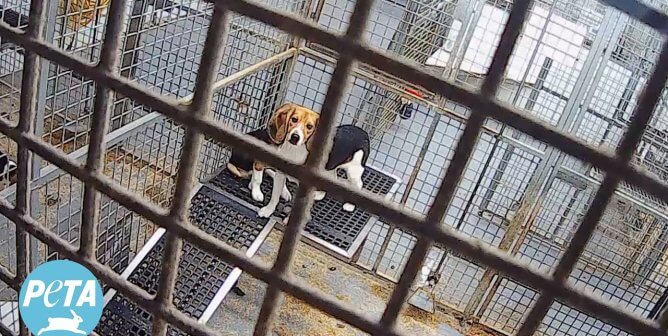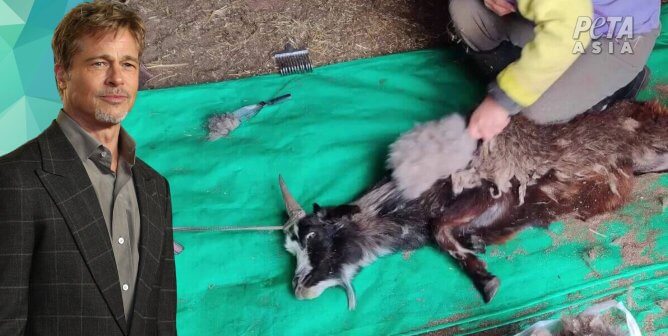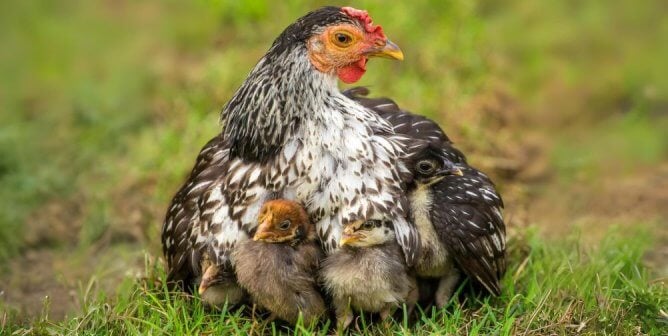PETA’s Top Tweets, TikToks, and More: Our Best Social Media Posts in 2022
Not only is PETA the largest animal advocacy organization in the world, we’re also the most engaged-with advocacy organization on social media. We have the highest number of people “liking,” sharing, and commenting on our Facebook posts, Instagram posts, tweets, and TikToks, which means that more people than ever are getting the message to end speciesism. Here’s a look at some of our social media work in 2022 that’s inspired people to live more compassionately.
Social Media Platforms Inform About Animals Used in Laboratories
In the more than 40 years since our historic Silver Spring monkeys case—the groundbreaking investigation that first thrust animal rights into mainstream consciousness—we’ve kept exposing horrifying abuse, stopping deadly experiments, and championing modern, animal-free test methods. The footage below of a twisted experimenter laughing after bashing in this monkey’s head still evokes emotional reactions decades later. It was viewed more than 225,000 times this year.
With our groundbreaking undercover investigation that blew the lid off neglect, intense confinement, suffering, and death at Envigo’s massive beagle-breeding facility in Cumberland, Virginia, PETA helped spark a historic domino effect that paved the way for the closure of the dog prison.
Thousands of beagles were transported to shelters across the U.S. for rehabilitation and adoption, and 25 of the dogs bred at Envigo to be sold into experimentation were transferred to PETA for much-needed TLC and veterinary care before being adopted into prescreened homes. This video of two of the beagles feeling grass for the first time caught the attention of thousands of Facebook users.
While PETA made great strides for animals used in laboratories in 2022, one pharmaceutical giant—Eli Lilly—has yet to pledge to PETA that it will never use the debunked forced swim test again. Our video received over 120,000 “likes” on TikTok.
@officialpeta Why does Eli Lilly want to continue dropping mice in beakers of water? Your guess is as good as ours.
♬ original sound – PETA
The forced swim test—also known as the despair test—has been heavily criticized by scientists, who have shown that it doesn’t predict how effective an antidepressant drug will be in humans. A coin toss is more accurate. Help PETA get this cruel and pointless experiment banned at Eli Lilly by taking action today!
PETA’s Best Social Media Posts About Animals Used for Food
More than 267,000 people viewed this video of a mother pig trying to help her piglet. A worker castrated him just outside the bars of her enclosure.
When pigs live in conditions in which they’re able to express their natural behavior, mothers sing to their newborns and form deep social bonds with them. On today’s farms, though, their babies are taken away from them and either killed for food or forced into breeding more piglets to be exploited. When the mothers’ bodies eventually give out, they’re killed for their flesh.
The only way to drink milk without harming cows is to opt for vegan milks, but some companies, like Starbucks, penalize customers who avoid dairy for ethical, environmental, religious, or health reasons. Our animal defenders are so committed to sticking around until the surcharge is abolished that they actually glued themselves to counters at Starbucks’ headquarters.
A cup of coffee may help get you through your day, but there’s no relief for cows used in the dairy industry. They’re repeatedly forcibly impregnated, their babies are stolen from them, and they’re killed when their bodies no longer produce enough milk to make them “profitable.”
When a customer received a chicken’s head in an order of fried chicken, the person was shocked and disgusted:
But they know what fried chicken is, right?
@officialpeta Once you realize… 🥴
♬ Wrong.. – Ash ✝️
Grinding up live male chicks is standard in the egg industry, where more than 200 million newborn chicks are killed each year because they’re “useless” in terms of profit.
@officialpeta Did your breakfast kill these baby birds? 💔 Billions are killed every year because people still eat eggs.
♬ original sound – PETA
Yes, even eggs labeled “free-range” and “cage-free” come from hatcheries that kill day-old male chicks and farms that exploit their mothers and sisters for their reproductive parts and flesh.
Spreading the Word About Animals Used for Clothing
Animals’ skin and fur belongs to them, and PETA’s social media team is working hard to make sure consumers know who they’re wearing when they purchase animal-derived products.
Our top Facebook post received more than 85,000 reactions and was shared by more than 9,000 people. Our PETA-made image depicts a coyote family torn apart by the fur industry. When an animal steps on the spring of a steel-jaw trap, the device’s jaws slam shut on the animal’s leg. Some animals, especially mothers who are desperate to get back to their young, attempt to chew or twist off their trapped legs.
Down industry workers often tear fistfuls of feathers from live ducks and geese, causing huge amounts of pain and stress, in order to steal their down. Imagine if your hair were torn out of your head.
If the birds are killed before being plucked, their deaths can be terrifying and slow, like it was for this goose whose beheading was filmed by a PETA Asia investigator:
https://www.tiktok.com/@officialpeta/video/7149608776352533802?is_from_webapp=v1&item_id=7149608776352533802&utm_campaign=tt4d_open_api&utm_source=7036369194396418050
Ducks, geese, and other birds should be able to spend their lives caring for their young, swimming, and foraging in their natural habitat like this family, not being abused on a farm or in a slaughterhouse:
Our Top Posts About Animals Used for Entertainment
When Ryder the horse collapsed in New York City, we made sure that people all over the world knew what had happened and how they could take action for horses forced to pull carriages.
Horses suffer when used for racing, especially at underground racetracks. From June 2021 to April 2022, a team of PETA operatives investigated unregulated horse racing in Georgia. They discovered a clandestine underworld of crime and cruelty, where racegoers wager hundreds of thousands of dollars and trainers and jockeys drug, whip, and electroshock horses to run as fast as possible—sometimes costing horses and jockeys their lives. Well over 100 of these tracks operate all over the U.S., flying largely under the radar.
@ ♬ –
Disney Dogs and Other Companion Animals Storm PETA’s Social Media Accounts
PETA Senior Social Artist Tiani Hernandez imagined how iconic Disney dogs would fare if they were forced to endure the same conditions that cruel and neglectful humans subject so many real dogs to. Her first image, featuring Dug from Up who is chained to a doghouse and crying, was “liked” more than 77,000 times.
Prong collars, e-collars, and choke collars can damage dogs’ fragile airways and result in painful lesions, collapsed tracheas, and even death. This sharable picture that flipped the script was “liked” more than 12,000 times. Using a simple buckle collar to hold a dog’s ID and license tags is a great idea, but dragging your furry buddy along by the neck is not.
Raising Awareness for Animals in Unexpected Ways
Our top post of 2022 was viewed more than 2 million times: PETA’s tongue-in-cheek compassionate gamer’s guide to Elden Ring and God of War Ragnarök made some big impressions on Twitter. The animals in the Lands Between and the Nine Realms deserve your respect—just as animals here in the real world do.
@officialpeta BOY, it’s like Grey Wolf Sif all over again. If you’re cold, they’re cold. Tyr was wrong to chain this pup up and leave him outside in the freezing cold of Helheim. @Sony, we need a “PETA mode” so #GodofWarRagnarok can be played without violence to animals! 🐺
♬ original sound – PETA
In a spicy call to action, we encouraged vegans in relationships to think of their nonvegan partners—and the impact their desires have on animals.
If you want to save animals and the planet, please don’t ditch showers—go vegan instead.
‘Like Animals? Here’s How You Can Help PETA Save More Lives
Animals are unique individuals with their own wants and needs. The notion that humans are entitled to exploit them is rooted in speciesism, the misguided belief that one species is more important than another. When we see all animals as deserving of respect, we understand that we must change our personal choices in order to stop contributing to their suffering. Going vegan is better for animals, your health, and the planet—make a positive change today.




